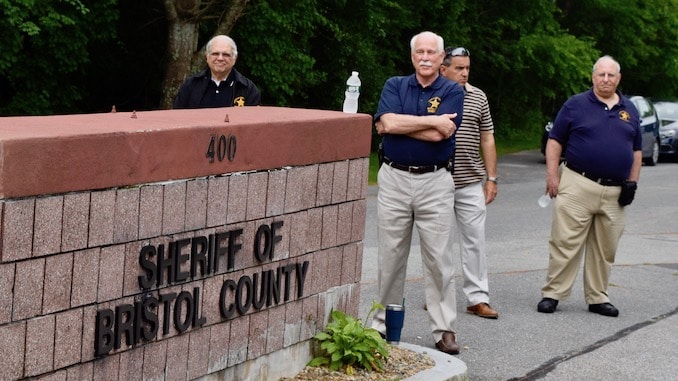Overcrowding and poor sanitation at Bristol County House of Correction could create public health crisis
“If large numbers are admitted to local hospitals in a short period, those hospitals could quickly become overwhelmed. This will impact surrounding communities as well, as services may be potentially inaccessible.” The Bristol County House of Correction (BCHOC) houses a large number of United States Immigration and Customs Enforcement (ICE) detainees in very close quarters. Up to 66 men in
March 21, 2020, 3:25 pm
By Uprise RI Staff
“If large numbers are admitted to local hospitals in a short period, those hospitals could quickly become overwhelmed. This will impact surrounding communities as well, as services may be potentially inaccessible.”
The Bristol County House of Correction (BCHOC) houses a large number of United States Immigration and Customs Enforcement (ICE) detainees in very close quarters. Up to 66 men in each building sleep in bunk beds in a single room. The beds are three feet apart, and meals are taken in the same room. The plastic trays used to ferry food pass through several hands by the time they reach a detainee. Hand soap is watered down and may be ineffective in preventing the spread of COVID-19.
Ira Alkalay, an attorney who frequently visits clients at the facility, believes that the living conditions at the jail may now place the entire community at risk.
“Because of the crowded conditions, it’s likely impossible to conform to the CDC [Center for Disease Control] protocols,” Alkalay states. “Not only are the detainees at risk from workers who enter the building each day, but corrections officers are also at risk. They already have a tough job and if they get sick, who will be willing to go into the facility to take over?”
The larger issue, Alkalay adds, “Should concern everyone. If the virus is introduced to the facility, large numbers of detainees could contract the illness at the same time. Some may have underlying health conditions, and are already stressed by the many factors impacting their situation, making them less resistant to illness. If large numbers are admitted to local hospitals in a short period, those hospitals could quickly become overwhelmed. This will impact surrounding communities as well, as services may be potentially inaccessible.”
Alkalay advocates for releasing detainees who have underlying medical issues and who otherwise pose little or no risk. “Many detainees do not have criminal convictions. Some have asked for voluntary departure, but are now essentially trapped in the facility indefinitely, given the ongoing changes in border closings and flights. There is no valid reason whatsoever to put the entire community at risk. It’s a matter of time before this happens and the public would do itself a service by pressuring ICE to avert a potential crisis.”
Bristol County community advocates are also very concerned about the possible impact on the greater community, in addition to those held and working within the jail.
Elizabeth Murphy, organizer of a grassroots Immigrant Support Network based in New Bedford, expressed great concern over the compounding challenges faced by local immigrant families, especially those with family members currently detained. “When a family member is detained by immigration officials, they can no longer contribute to the family’s wellbeing, either by earning income, caring for children, or managing a household. Bonds, if granted, can sometimes take a year to secure, and during that time a detainee is sitting in a facility unable to contribute. This situation is terrible in normal circumstances, but with COVID-19, the system has ground to a halt.”
LaSalla Hal, President of the New Bedford Branch of the NAACP said, “We view this situation as a hazard to the public health of the community. Any safety hazard that occurs inside of BCHOC that is not addressed in the proper way poses a threat to the community as workers, guards and other workers that frequent the BCHOC may spread the COVID-19.”
“The Greater Southeast Massachusetts Labor Council is concerned about the conditions of detainees, as wells as employees at the Dartmouth prison,” said Lisa Lemieux, President of the Labor Council. She continued, “Reports of overcrowding and potentially sick guards indicate that there is a great threat of the coronavirus spreading not just inside the jail, but in the greater community, as workers come in and out of the facility.”
Executive Director Deb Fastino of the Coalition for Social Justice, “We are very concerned that Sheriff Hodgson is not abiding by the Governor’s ban on gatherings larger than 25 people. He is housing over 120+ people in 2 rooms, 60+ people to a room. If the virus breaks out, it will rip through this group of people, devastating them, and overwhelming the resources of hospitals in the Southcoast, making them unavailable for the rest of the population.”
“These reports must be investigated immediately, and if found to be valid, detainees must be removed,” said Rafael Pizarro of the Bristol County for Correctional Justice group. “Guards, food service personnel, medical personnel and others enter and leave the jail regularly, so there is a public safety issue here.”
“Bristol County needs to be more pro-active to reduce the number of detainees in ICE custody. Detainees who have already requested voluntary departure should be allowed to travel as soon as possible and not kept in these dangerous conditions. Detainees eligible to be released on bond should be able to be released as well,” said Corinn Williams, Executive Director of the Community Economic Development Center.
- Bristol County for Correctional Justice
- Greater Southeast Massachusetts Central Labor Council
- New Bedford Chapter, NAACP
- Immigrant Support Network
- Coalition for Social Justice
- Community Economic Development Center






